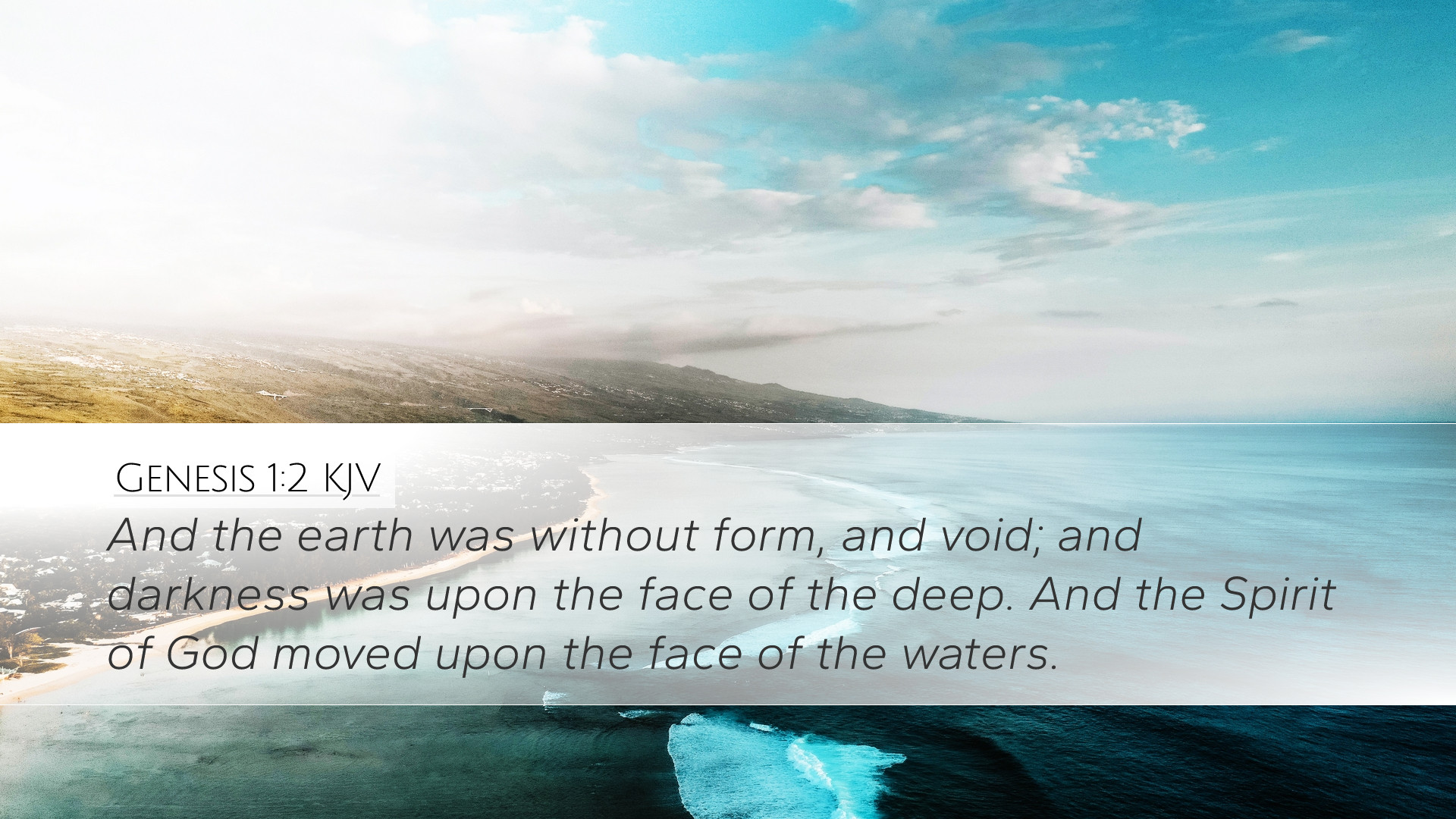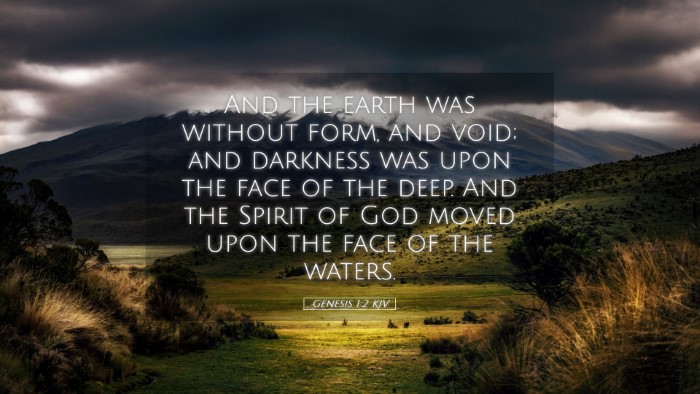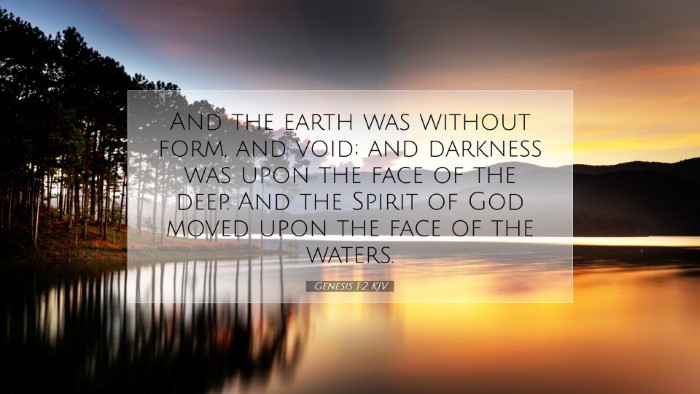Commentary on Genesis 1:2
Genesis 1:2 (KJV): "And the earth was without form, and void; and darkness was upon the face of the deep. And the Spirit of God moved upon the face of the waters."
Introduction
The second verse of Genesis sets the stage for the creation narrative that unfolds throughout the chapter. In this commentary, we will explore the theological, literary, and exegetical significance of Genesis 1:2, drawing insights from various public domain commentaries, chiefly those of Matthew Henry, Albert Barnes, and Adam Clarke.
The Condition of the Earth
This verse describes the initial state of the earth as “without form, and void.” The Hebrew terms tohu (without form) and bohu (void) suggest a chaotic and desolate state, devoid of order and life. Matthew Henry emphasizes that this imagery represents a state of uncreated chaos before God’s creative acts begin. It indicates that the universe did not self-generate but rather derives its existence from the divine will.
Insights from Commentators
- Matthew Henry: He elucidates that the "earth" signifies the material world, while the phrase underscores the need for God's creative intervention. Henry posits that God can create order out of chaos, a theme that resonates throughout biblical history.
- Albert Barnes: He further elaborates on the terms "without form" and "void," noting their connotation of emptiness, likening it to a palatial city before it is built. Barnes emphasizes the need for God’s authority and power to bring forth creation from such a void.
- Adam Clarke: Clarke interprets the term "darkness" as symbolizing ignorance and spiritual blindness, contrasting with the light that God will soon create. He draws a parallel between the physical darkness and the moral darkness of the human condition prior to divine illumination.
The Presence of Darkness
The verse indicates that "darkness was upon the face of the deep." This introduction of darkness suggests the absence of God’s light and order. The phrase "face of the deep" refers to the primordial waters, highlighting the chaotic state of creation. Henry notes the profound symbolism of darkness as a representation of evil and disorder, yet contrasts it with the anticipation of divine light breaking through.
Symbolism of Darkness
- Theological Significance: Darkness is frequently employed throughout Scripture as a metaphor for sin, ignorance, and chaos. It serves as a reminder of the need for divine intervention to bring forth light and understanding.
- Literary Function: In this canonical creation account, the introduction of darkness heightens the impact of the forthcoming creation of light. This literary technique sets the stage for the dichotomy between chaos and order, sin and salvation.
- Clarke's Observation: Clarke posits that just as God spoke light into existence, so too He can dispel the darkness of hearts and minds, underscoring the consistent theme of redemption throughout Scripture.
The Role of the Spirit of God
Following the description of the chaotic state of the earth, the text notes that "the Spirit of God moved upon the face of the waters." This phrase is pivotal in understanding God's active participation in creation. The term "moved" is rich with implications, reflecting both dynamic motion and the nurturing aspect of the Holy Spirit.
Commentators’ Insights on the Spirit
- Matthew Henry: He articulates that the Spirit’s movement is a sign of preparation, suggesting an imminent transformation of chaos into order. This presents the Holy Spirit as an agent of creation, involved deeply and intimately in the creative process.
- Albert Barnes: Barnes affirms that the Spirit of God is both a creative and sustaining force. He notes that this movement indicates God's intention and purpose, preparing the world for the subsequent acts of creation.
- Adam Clarke: Clarke approaches this verse from a Trinitarian perspective, viewing the movement of the Spirit as an indication of the pre-incarnate work of Christ, alongside the Father, in the creation of the world.
Theological Implications
Genesis 1:2 offers profound theological insights that resonate through the entirety of Scripture.
Order from Chaos
- The theme of God bringing order from chaos is central not only to the creation narrative but throughout biblical history. This mirrors the concept of divine sovereignty, where God is portrayed as having the authority to establish creation.
- Understanding this dynamic encourages believers to trust in God’s ability to bring order and meaning into chaotic circumstances in their own lives.
The Presence of the Spirit
- The active role of the Spirit of God emphasizes the Trinity’s involvement in creation. This lays a foundation for understanding the subsequent actions and roles of the Holy Spirit in both the Old and New Testaments.
- It intimates a relationship between creation and redemption, as the very Spirit that moved over the waters will also play a crucial role in the regeneration and sanctification of believers.
Conclusion
Genesis 1:2 invites reflection upon the nature of God as Creator and the role of the Spirit in bringing order from chaos. Insights from Matthew Henry, Albert Barnes, and Adam Clarke enrich our understanding of these themes, revealing the depth of God’s purposeful design in creation. For pastors, students, theologians, and Bible scholars, this verse serves as a powerful reminder of God’s sovereignty, the transformative power of the Spirit, and the ongoing narrative of grace and redemption that unfolds throughout Scripture.


